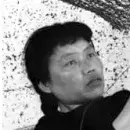
Ruth Aiko Asawa
Ruth Aiko Asawa was a sculptor, public artist, and arts education advocate, known for her abstract looped-wire sculptures, abstract and figurative drawings and prints, and activism for arts education and public art.
In 1942, members of her family were sent to different internment camps for Japanese Americans. Asawa went to Rohwer Relocation Center in Arkansas and then studied at Milwaukee State Teachers College (now University of Wisconsin–Milwaukee) in 1943. She moved to Black Mountain College in North Carolina (1946–1949) and began making looped-wire sculptures inspired by basket crocheting techniques learned during a 1947 trip to Mexico. In 1955, she held her first exhibition in New York and by the early 1960s, she had achieved commercial and critical success and became an advocate for public art as “art for everyone.”
She was the driving force behind the creation of the San Francisco School of the Arts, renamed the Ruth Asawa San Francisco School of the Arts in 2010. In 1968, she was appointed to the San Francisco Arts Commission and lobbied politicians and charitable foundations to support arts programs for young children and all San Franciscans. Asawa cofounded the Alvarado Arts Workshop for schoolchildren in 1968. Asawa served on task forces and committees of the National Endowment for the Arts (1972–1978) and the California Arts Council (1975–1979), and as a trustee of the Fine Arts Museums of San Francisco (1989–1997).
Asawa’s sculptures can be found in the collections of the de Young Memorial Museum in San Francisco, Solomon R. Guggenheim Museum, Whitney Museum of American Art, Museum of Modern Art in New York, Crystal Bridges Museum of American Art, LA County Museum of Art, San Francisco Museum of Modern Art, San Jose Museum of Art, and Nora Eccles Harrison Museum of Art, among others.
The image of Asawa on this page is from the cover of Ruth Asawa: Life’s Work, a fully illustrated catalogue co-published by Yale University Press and the Pulitzer Arts Foundation featuring several installation images of Asawa’s work at the Pulitzer Arts Foundation.